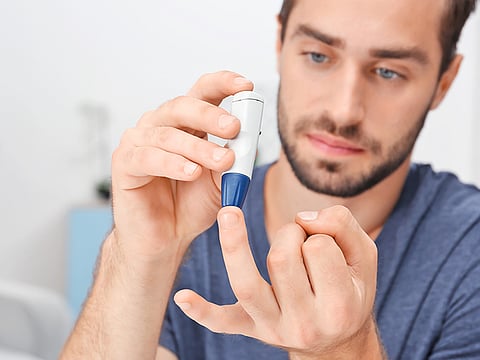Hyperglycaemia Vs Hypoglycaemia
Blood glucose levels fluctuate differently depending on people’s type of diabetes, so an understanding of this is key to them staying healthy, especially if they’re fasting during the holy month

If you suffer from diabetes, managing your blood glucose or blood sugar levels is an essential factor in maintaining a healthy lifestyle. If you don’t manage your blood glucose levels and you are diabetic, it can result in hyperglycaemia. This occurs when there are abnormally high blood glucose levels in the blood. If left unmanaged, it can lead to complications such as heart and kidney diseases.
A failure to manage your blood glucose levels can result in hypoglycaemia, which occurs when there are low glucose levels in the blood. If left unmanaged, it can lead to unconsciousness and even seizures in extreme cases.
Dr Mohamed Hassanein, Consultant Endocrinologist, Dubai Hospital, Dubai Health Authority (DHA), refers to the type of patients he commonly encounters who suffer from low blood sugar: “This is a condition that rarely occurs in healthy people and it’s primarily a problem for those with diabetes, due to the side effects of medication. There is a mismatch in terms of the amount of insulin in their medication and the amount of glucose in the body from food.
“The person will feel a number of symptoms including trembling, dizziness, faintness, elevated heart rate and sweatiness.” Dr Hassanein explains that diabetics need to check their blood glucose levels to avoid an imbalance between their medication and their needs. This is particularly significant if you are fasting during Ramadan. “The insulin injection doesn’t know a diabetic has decided to fast,” he says. “If you suddenly go for a run or play football and burn many of your calories, the injection doesn’t have the intelligence of a pancreas, which will match the production of insulin according to blood glucose levels. This is when a mismatch can happen.”
Consulting a doctor
All diabetics are encouraged to regularly communicate with healthcare professionals, particularly if there is a fluctuation in their blood sugar levels. This is especially important if you are planning to fast for Ramadan. “You have to visit a specialist to assess your own individual risk and try to assess if it’s safe to fast or not,” says Dr Hassanein. “Diabetics need to be trained and informed about all of the measures to make it safer for them to fast for the month.”
He explains that the disruption to your regular eating patterns means that if you don’t amend your medication routine accordingly and check your blood sugar frequently, it can lead to health issues. “On normal days, we are snacking and sustaining our blood glucose levels throughout the day. During Ramadan, Muslims are not eating or drinking from dawn to dusk. Therefore, the risk for some people will be higher. To overcome that risk, they need to check their blood sugar levels regularly, especially late afternoon before iftar.”
Fasting against medical advice
A common issue is when people with diabetes ignore their doctor’s advice and go ahead and participate in fasting despite being warned of the probability that it can be detrimental to their health. There is no religious basis for fasting if it’s likely to harm their health but, unfortunately, some proceed regardless. Dr Hassanein is keen to stress that even if diabetics are going against professional advice, they should still inform healthcare professionals of their intention. “Globally, it has been noted that the passion for fasting means that many people fast against medical advice,” he says.
“If you are planning to fast against advice, it’s important to consult a professional with expertise in the field to try to do this in the safest way possible. You should also accept that you have to break the fast if things go wrong.”
Complicated circumstances
If sufficiently informed, diabetics and their friends and family will be able to recognise the signs and symptoms of blood sugar fluctuations and act accordingly. The medical consensus for people who are fasting is that they should break their fast. “We advise that you have to communicate with your healthcare professionals, especially when there is something that is out of the norm,” says Dr Hassanein. “If you were suddenly to develop a low blood glucose episode, you should immediately stop your fast and have a sugary drink followed by a small meal. You then need to consult your healthcare professional in case your treatment needs further adjustment or that I’m not suitable for fasting.”
Nevertheless, in some cases, diabetics may not even experience pronounced symptoms that inform that their blood sugar levels are fluctuating. “Unfortunately, for some people with a long history of diabetes, their alarm system for low levels of glucose levels in the blood is impaired. In that case, they don’t get the symptoms that quickly alarm them or don’t get them at all. These people are at a much higher level of risk if they are not eating or drinking food,” explains Dr Hassanein.
Education is key
Each February a conference is held about diabetes and Ramadan in Dubai, where international experts congregate to gain a deeper understanding of the subject. Diabetes and Ramadan Alliance (DAR) has also created internationally recognised guidelines. “We have developed guidelines in collaboration with the International Diabetes Federation and it’s been published for global use,” says Dr Hassanein. “Also, in Dubai Hospital, DHA, we have conducted a number of clinical studies and patient education programmes to help achieve a better understanding of Ramadan and diabetes.”
Sign up for the Daily Briefing
Get the latest news and updates straight to your inbox

